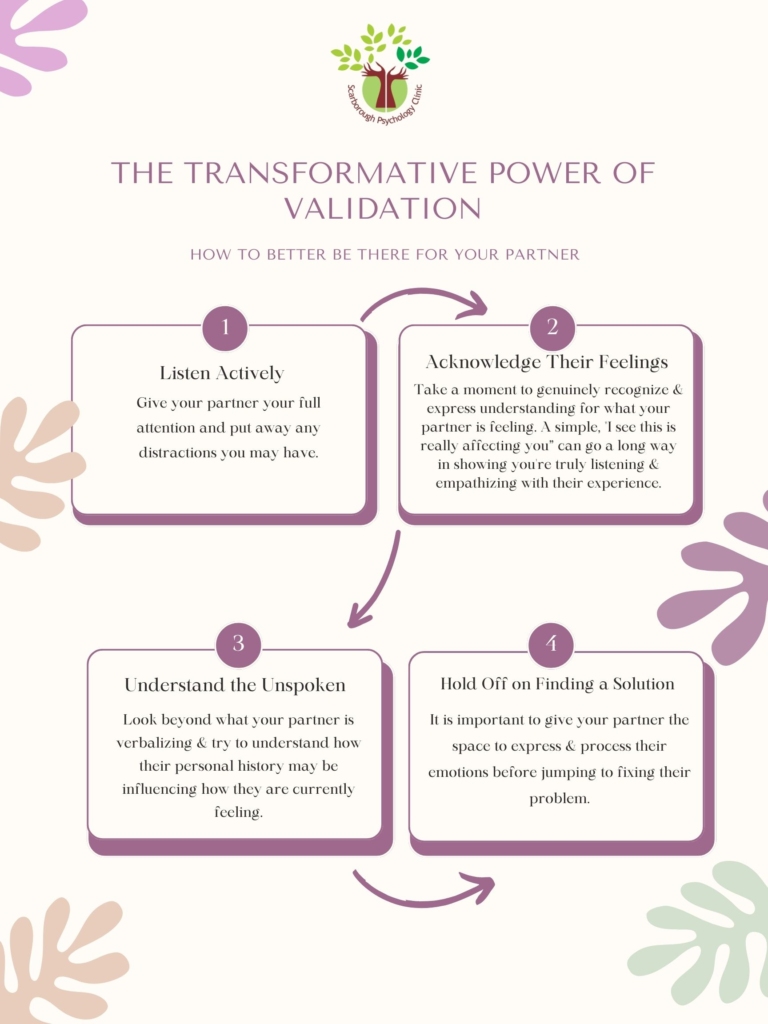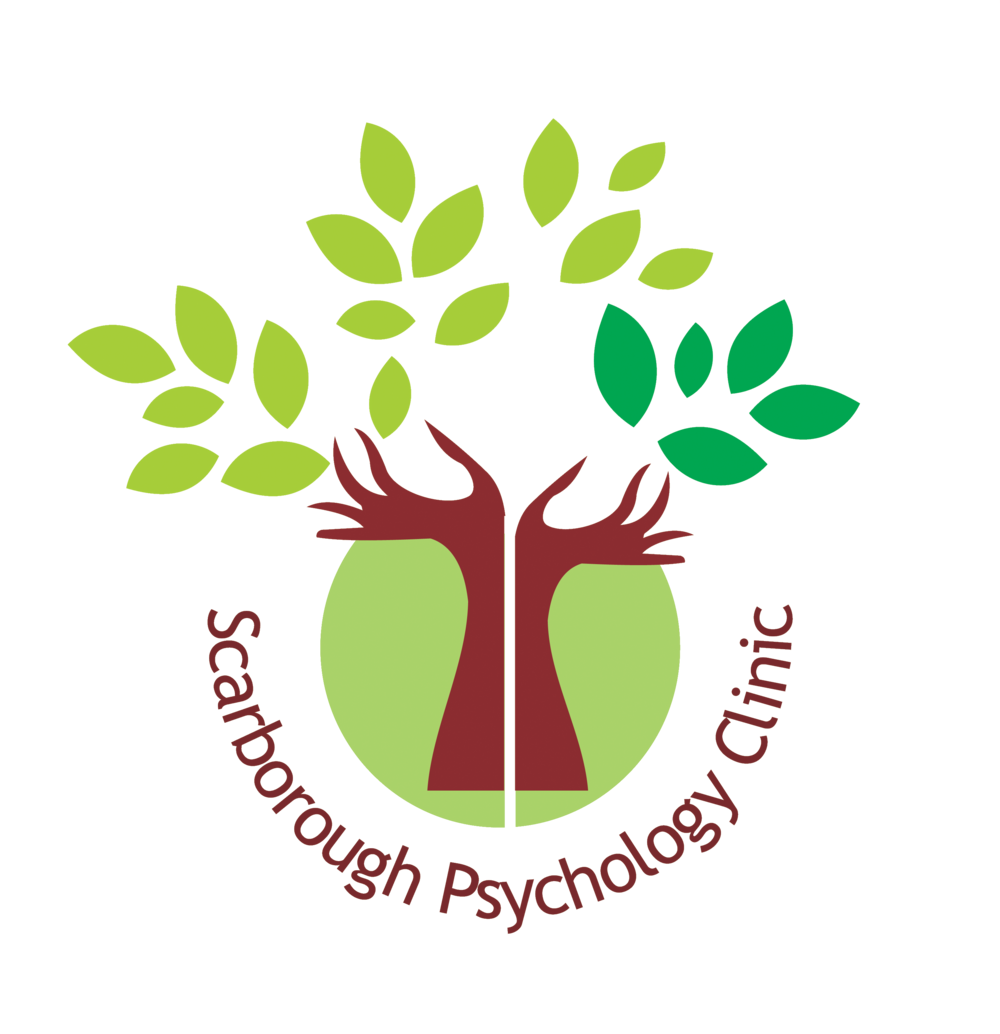Have you ever found yourself in a situation where you felt strong internal emotions dismissed or made to seem insignificant by a partner? How did this make you feel? Now, think of when you expressed your feelings, and your partner listened and tried to understand you. How did this make you feel? Most Likely, having your emotions dismissed and invalidated by a partner makes you feel like they are unimportant or invalid, makes you question their legitimacy, and creates a rift between you and your partner.
Conversely, a more understanding and validating response by a loved one most likely made you feel understood, accepted, and more emotionally connected. The truth is that everyone wants their emotions validated, but not everyone knows how to do so or when their emotional needs are going unmet.
What is Validation?
Validation in a relationship is a process led by empathy that acknowledges and accepts another person’s emotional experience as valid and significant. It is necessary for any healthy relationship as it shows one’s partner that they are understood, even if you disagree. It is important to remember that validation does not condone negative behaviours but establishes trust and support, opening the door to positive growth and change and allowing each partner to navigate their emotions.
What is Invalidation and How May it be Impacting Your Relationship?
Invalidation, especially from a partner, can be hurtful and leave one feeling rejected or judged. Recognizing its signs and symptoms helps build and maintain a healthy relationship with oneself and one’s partner. Emotional invalidation involves the dismal or rejection of someone’s experience and can be intentional or unintentional.
Responses like “it could be worse” or “look on the bright side” may be well-intentioned but often fail to acknowledge the person’s emotional state. Further, invalidation can also come in the form of mocking, denying, judging, ignoring, or minimizing someone’s experiences.
Validation in relationship: Small Things Often Have a Big Impact
In a partnership, seemingly insignificant moments to one partner may hold power and emotional significance for another, causing a rift in the relationship. This can be in the form of an off-hand comment or efforts that go unacknowledged by a partner. When these feelings lay dormant, it often leads to feelings of alienation and distrust.
Further, when handled inappropriately, these initially “minor” feelings may grow and morph into something new, jeopardizing the relationship. It is normal for instances of perceived minor actions or miscommunication to arise, but they do not need to be detrimental to a relationship. It is important to understand three things: the power of “minor actions,” the importance of bringing up small things, and the role of validation in communication.
- The power of minor actions: What one partner may perceive as minor or inconsequential can significantly impact the other. A small gesture of kindness, like making coffee in the morning, can reinforce feelings of love and appreciation. Conversely, seemingly trivial actions or negative or dismissive remarks can accumulate over time, leading to resentment or disconnection.
- Bringing up the little things: It’s crucial for partners to feel safe and encouraged to bring up things that bother them, no matter how minor they seem. Encouraging open communication about small grievances allows couples to address and resolve issues before they snowball into more significant problems. Communication strategies such as regular check-ins or establishing a “no small thing is too small” policy can be helpful.
- The role of validation in communication: Validation acts as a bridge between differing perceptions and experiences within a relationship. When partners validate each other’s feelings, they communicate, “Your feelings are important to me, even if I don’t fully understand them.” This process fosters a deeper emotional connection and mutual respect. Validation does not mean agreeing with your partner on every point but recognizing and affirming their right to their feelings.

Turning Disagreements into Opportunities for Growth
An article published on the research-based website “The Gottman Institute” outlines how a couple uses their fights to “repair our relationship.” They underscore the importance of working together when conflicts arise and changing one’s mindset from a you vs. me mindset to an us vs. the problem mindset. This means navigating through conflicts to resolve them and using them as stepping stones towards understanding and growth within the relationship. This approach aligns with the core message of validating even the seemingly minor grievances, recognizing that it’s the underlying emotions and needs that matter most. By actively addressing and processing these conflicts, couples can transform moments of disagreement into stronger bonds.
Validation in relationship: How Can You Better Validate Your Partner
Be present and listen actively:
Give your partner your full attention. This means putting aside any distractions and showing your interest through your facial and body language.
Acknowledge their feelings:
This can be done by reflecting on what you’ve heard them say. Statements like “It sounds like you’ve been working hard to overcome this problem” can go a long way for you and your partner.
Validate the unspoken context of the conversation:
This can mean looking at things like body language or making sense of their feelings given their personal experiences. For example, “Considering this is your first big project at your new job, it makes sense that you feel anxious and nervous.”
Don’t Rush to Find a solution:
You may feel it necessary to jump to “fixing” your partner’s problems before they have finished processing them. Although this is well-intentioned, it may not be what your partner needs yet. Be sure to allow your partner to process their feelings before jumping in.
If you are struggling in your relationship, talk to Scarborough Psychology’s therapist for couples therapy. Click here to book an appointment.
Further Readings
Fruzzetti, A. E. (2006). The High-Conflict Couple: A Dialectical Behavior Therapy Guide to Finding Peace, Intimacy, and Validation. New Harbinger Publications. https://www.newharbinger.com/9781572244504/the-high-conflict-couple/
Rosenberg, M. B. (2015). Nonviolent Communication: A Language of Life (3rd ed.). PuddleDancer Press. https://www.cnvc.org/store/nonviolent-communication-a-language-of-life
https://www.mcleanhospital.org/sites/default/files/shared/BPDWebinar-Galen-Validation-Webinar10.13.16.pdf
https://www.gottman.com/

